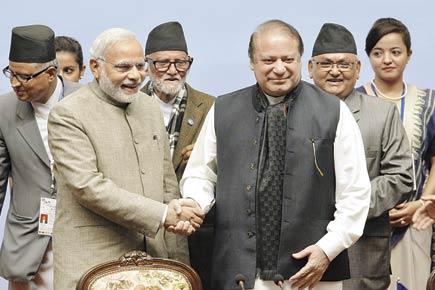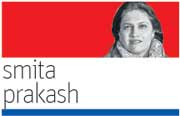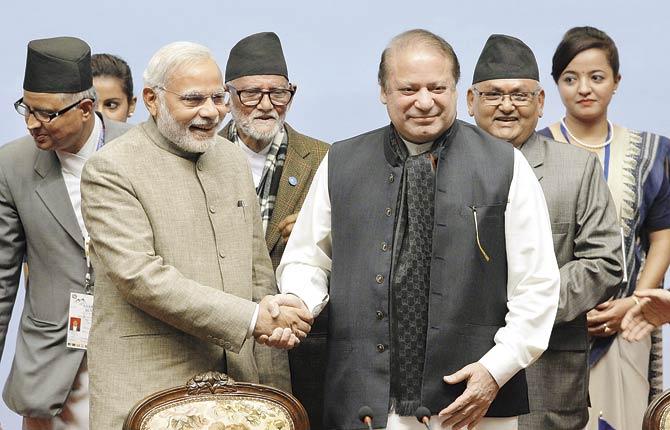If you were to be charitable you would say that India’s Pakistan policy is dynamic, as it changes according to the times

 If you were to be charitable you would say that India’s Pakistan policy is dynamic, as it changes according to the times. If you were to be hyper-critical then you would say India’s Pakistan policy, regardless of which party is in power, is knee-jerk reactive to events.
If you were to be charitable you would say that India’s Pakistan policy is dynamic, as it changes according to the times. If you were to be hyper-critical then you would say India’s Pakistan policy, regardless of which party is in power, is knee-jerk reactive to events.
When Prime Minister Narendra Modi met with Pakistan’s Prime Minister in the Russian city of Ufa about a week ago, there were cheers that went out in many capitals in the world. Expectations soared once again that the two countries would return to the negotiating table and attempt to settle outstanding issues.
ADVERTISEMENT

Prime Minister Narendra Modi shakes hands with Pakistan’s Prime Minister Nawaz Sharif at the 18th SAARC summit at Nepal in November, 2014. When the two met again in the Russian city of Ufa about a week ago, expectations soared that the two countries would return to the negotiating table. Pic/AFP
It is the wish of every Indian Prime Minister to be the ultimate statesman who resolves disputes with Pakistan. The misplaced belief that hoping and wishing to sort out differences can actually translate into similar intentions from the other side. Whether it is naivety or ‘statesmanitis’ you cannot fault an Indian Prime Minister for trying when his predecessors had failed. Every man thinks he can improve on his predecessor’s track record.
The foreign office announced that the Indian Prime Minister would be travelling to Islamabad to participate in the heads of government meet of SAARC in 2016. A lot can happen between now and then. As has been evident since the announcement was made. The past week has seen intensive firing across the border, bizarre refusal of Eid sweets by Pakistani forces at the border and a spurt in anti-India rhetoric in Kashmir.
SAARC has largely been a platform for India-Pakistan rivalry overshadowing almost everything else. If at all anything has been achieved, it’s been at the bilateral level with SAARC nations, or else India with the others, minus Pakistan. Not even a genial and mild mannered Dr Manmohan Singh could make any significant breakthrough in India-Pakistan relations, the aborted Sharm-el-Sheikh exercise being a case in point. His desire to visit Gah, his birthplace, remained unfulfilled. Some who profess to be close to Dr Singh say that he had no such over-riding desire given the fact that he is not really a sentimental person. It was the India-Pak candle-walas who thought it would be great optics for an Indian PM to travel to his birthplace in Pakistan. Sentimentality, frankly, has little place in strategic relations. Personality politics do matter to some extent.
General Zia’s cricket diplomacy in Delhi or General Musharraf’s visit to his home in Old Delhi did little to change the mindset of the military establishment in Pakistan, which thrives on conflict with India, both linear and non-linear.
When an Indian Prime Minister travels abroad, his security is also the responsibility of the host country. There is a bounty out on Mr Modi’s head in Pakistan. Placed by none other than the head of the Jamaat-ud-dawa: a banned outfit that receives funding from the Chief Minister of Pakistani Punjab province, who happens to be their Prime Minister’s brother.
Can the Special Protection Group that is in charge of the Indian Prime Minister’s security ensure that Mr Modi will be unharmed? The Prime Minister should know that he is not just an individual wanting to travel to a neighbouring country. He is representing a country whose political leadership is despised by the military of Pakistan. Plain and simple. The military-jehadi network of Pakistan has made no attempt to hide their intense dislike for Mr Modi. It is not so much the BJP that the Pakistani establishment is suspicious of. They are convinced that the RSS and its Hindutva agenda do not recognise the existence of Pakistan and will use Mr Modi to annihilate their country. Fuelling this view are the jehadis who, ever since May 2014, have renewed their call for Gazwa-e-Hind, or the holy war to eliminate India.
According to one report quoting an unnamed source, India and Pakistan have committed now to talks regardless of what happens on the border. Clearly Mani Shankar Aiyar is having the last laugh. ‘Uninterrupted and uninterruptible’ talks supposedly are now a reality. And the NDA government, not the UPA, is supposedly delivering that. How the wheel turns!
Some foreign policy stalwarts argue that if President Obama can with Iran, why can’t Modi with Pakistan. Apples and Oranges. Iran has first been crushed under sanctions. And then comes the magnanimous offer. India would be better placed to make itself an economic and military power first rather than talk of being one. And then make the overtures. First things first.
As the famous poet Ramdhari Singh ‘Dinkar’ wrote: Sach poocho toh shar mein hii basti hai deepti vinay kii/ Sandhivachan sampujya usiika jisme shakti vijay kii. (The truth is that it is in the quiver that the light of modesty shines. Only his peace overtures are appreciated who has strength.)
Smita Prakash is Editor, News at Asian News International. You can follow her on Twitter @smitaprakash
 Subscribe today by clicking the link and stay updated with the latest news!" Click here!
Subscribe today by clicking the link and stay updated with the latest news!" Click here!







